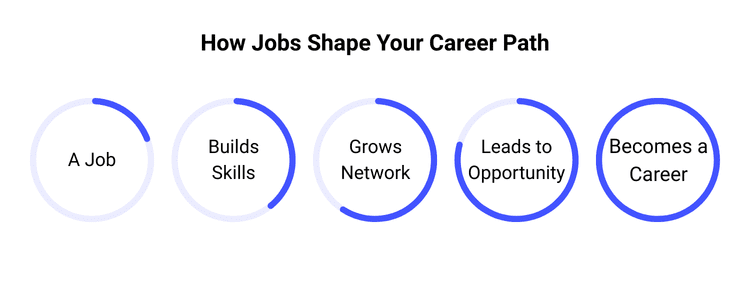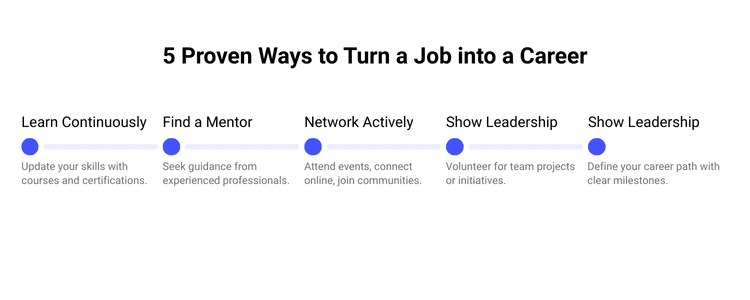The job market is evolving, driven by trends like artificial intelligence (AI), automation, and remote work. Understanding the difference between job vs career is crucial for navigating this dynamic landscape.
A job typically provides immediate income through short-term or task-focused roles, while a career is a long-term journey emphasizing personal growth, professional development, and fulfillment. Choosing a job vs a career depends on your long-term goals and current lifestyle.
- 1. What Is a Job? Defining the Basics
- 2. What Is a Career? A Long-Term Journey
- 3. Job vs Career: 10 Key Differences
- 4. Why Does the Job vs Career Distinction Matter?
- 5. How Jobs Shape Your Career Path
- 6. 5 Proven Ways to Turn a Job into a Career
- 7. Adopting a Career-Oriented Mindset
- 8. Job vs Career: Which Is Right for You?
- 9. Frequently Asked Questions
- 10. Final Thoughts on Job vs Career
What Is a Job? Defining the Basics
A job is a position of employment where an individual performs specific tasks in exchange for payment, primarily to meet immediate financial needs. Jobs are often short-term or temporary, requiring minimal specialized training or education beyond basic skills. They can be full-time or part-time and focus on completing assigned tasks with limited emphasis on long-term growth or personal investment.
Common examples include retail sales associates, cashiers, waiters, freelance writers, or temporary administrative assistants. For instance, a teenager might take a job at 13 as a babysitter to earn pocket money, with no intention of pursuing it long-term. These types of jobs prioritize income over emotional attachment or career advancement.
Key Characteristics of a Job:
- Duration: Short-term, often temporary or project-based.
- Purpose: Primarily to earn income for immediate needs.
- Skill Development: Limited need for continuous learning; skills are often role-specific.
- Emotional Investment: Low to moderate, with minimal personal attachment.
Jobs are essential for financial survival, but may not offer the growth or fulfillment associated with a career. Understanding what a job entails is the first step toward planning a more intentional professional path or even determining how to build a career from foundational roles.
What Is a Career? A Long-Term Journey
A career is a long-term professional journey that involves a series of roles, experiences, and skill development within a specific field or industry. Careers require specialized education, training, or certifications and focus on personal growth, professional advancement, and fulfillment. Unlike jobs, careers are deeply tied to personal identity and purpose, offering opportunities for promotions, increased responsibilities, and higher salaries.
Examples of careers include software engineering, teaching, law, medicine, or management consulting. For instance, someone pursuing a career as an electrician undergoes apprenticeships and certifications to build expertise over the years. Building a career path often starts with entry-level jobs in your chosen field. Careers often include benefits like health insurance, retirement plans, and paid leave, enhancing financial security and work-life balance.
Key Characteristics of a Career:
- Duration: Long-term, often spanning decades.
- Purpose: Combines income with personal growth and fulfillment.
- Skill Development: Requires ongoing learning to stay competitive.
- Emotional Investment: High, often tied to personal identity and values.
Careers are built through deliberate choices, education, and experience, offering a path to lasting satisfaction and professional impact. In 2025, careers in fields like AI, green energy, and healthcare technology are particularly promising.

Job vs Career: 10 Key Differences
| Aspect | Job | Career |
|---|---|---|
| Duration | Short-term, often temporary | Long-term, spanning years or decades |
| Purpose | Primarily for income | For income, growth, and fulfillment |
| Commitment | Low to moderate, task-focused | High, with long-term dedication |
| Skill Development | Limited; role-specific skills | Ongoing learning and professional growth |
| Progression | Limited or no advancement | Opportunities for promotions and leadership |
| Emotional Investment | Low; minimal personal attachment | High; tied to identity and passion |
| Financial Stability | May be unstable, fewer benefits | Greater stability, often with benefits |
| Networking | Limited; few industry connections | Extensive; builds industry relationships |
| Personal Identity | Rarely defines self-worth | Often central to personal identity |
| Work-Life Balance | May offer short-term flexibility | May demand more but offers long-term balance |
This breakdown highlights the difference between a job and a career and why understanding this distinction matters more than ever in today’s shifting economy.
Why Does the Job vs Career Distinction Matter?
The distinction between a job and a career has significant implications for your professional and personal life, particularly in the context of 2025’s evolving job market. Here are the key reasons why it matters:
- Financial Stability: Careers typically offer higher salaries, bonuses, and benefits like health insurance and retirement plans, which are less common in jobs. This stability supports long-term financial planning, such as buying a home or saving for retirement.
- Job Satisfaction: Careers align with personal passions and goals, leading to greater fulfillment. A job, while necessary for income, may feel transactional and less rewarding. For example, a yogi may find deep satisfaction in teaching mindfulness, whereas a temporary retail job may not offer the same purpose.
- Adaptability to Change: Technological advancements, particularly in AI and automation, are transforming the labor market. According to Forbes’ Job Market Expectations, careers that emphasize continuous learning ensure you remain competitive. This adaptability is vital when choosing a career vs job path.
- Work-Life Balance: While jobs may provide short-term flexibility (e.g., part-time hours), careers offer long-term stability and benefits that support a balanced lifestyle. For instance, a career in tech might include remote work options, a trend stabilizing in 2025.
- Personal Growth: Careers foster skill development, leadership, and confidence through challenging roles, unlike jobs that may focus on routine tasks.
- Societal Impact: Careers provide platforms to influence your field or community, such as a career in healthcare, contributing to public health.
This distinction is vital for aligning work with personal values, especially with 2025 trends like workplace wellness and salary transparency.
How Jobs Shape Your Career Path
Even short-term jobs play a critical role in building a career by providing skills, experience, and connections. Here’s how:

Jobs Build Your Skill Set
Every job teaches transferable skills that contribute to career growth. For example, a retail job develops customer service, time management, and teamwork skills, which are valuable in careers like marketing or management. Even unrelated jobs, like waiting tables, enhance communication and problem-solving, sought after in many fields.
Networking Opportunities from Jobs
Jobs introduce you to colleagues, supervisors, and professionals who can become part of your professional network. These connections may lead to mentorship, referrals, or career opportunities. For instance, a freelance writing gig might connect you with editors who recommend you for a publishing role. Learning how to do networking is vital in 2025, as remote work expands global opportunities and helps determine how to build a career strategically.
How Jobs Lead to Career Opportunities
Jobs often serve as entry points to a career. An internship or entry-level role can lead to full-time opportunities in the same field. For example, starting as a data entry clerk could pave the way to a data analyst career with training in data visualization tools. Treating jobs as stepping stones ensures they contribute to long-term goals and a stronger career path.
5 Proven Ways to Turn a Job into a Career
Transforming a job into a career requires intentional effort. Whether you’re in retail, freelancing, or an entry-level corporate role, these five strategies can help you build a strong career path and align your current work with long-term goals.

1. Pursue Continuous Learning
Ongoing education is key to career development. Upskilling through online courses, certifications, or workshops enhances your qualifications and keeps you competitive.
- Use learning platforms: Websites like Coursera, LinkedIn Learning, and edX offer flexible, affordable programs. For example, Google’s IT Support Certificate can help you enter tech, while HubSpot Academy is great for marketing beginners.
- Choose relevant certifications: A cashier aiming to move into management could take a retail operations course. Someone in hospitality might study customer experience management.
- Tip: Dedicate 1-2 hours a week to learning something aligned with your desired career.
Continuous learning is central to building a long-term career path, especially in fast-changing industries.
2. Find a Mentor for Guidance
Mentorship provides direction, encouragement, and insights that shorten your learning curve.
- How to find a mentor: Reach out on LinkedIn, join professional associations, or ask a senior colleague in your current job. Alumni networks and industry Slack communities are also valuable.
- What to ask: Discuss their career journey, industry trends, and advice on your next steps. Ask how they transitioned from jobs to a fulfilling career.
- Example: A junior graphic designer could benefit from regular check-ins with an art director, getting feedback on work and career planning.
A mentor doesn’t just guide — they also open doors to new career opportunities and keep you accountable as you build your future.
3. Expand Your Professional Network
A strong network connects you to job opportunities, referrals, and insider knowledge in your field.
- Attend events: Use platforms like Meetup, Eventbrite, or LinkedIn Events to find webinars and conferences in your industry.
- Join groups: Participate in LinkedIn Groups or Reddit communities relevant to your career goals.
- Do informational interviews: Reach out to professionals in your target field to learn about their day-to-day work and how they built their career.
In 2025, virtual networking is more important than ever. Building meaningful relationships helps turn temporary jobs into career-building stepping stones.
4. Take on Leadership Roles
Leadership isn’t limited to titles — it’s about taking initiative, solving problems, and motivating others.
- Volunteer for responsibility: Take charge of a team project, suggest workflow improvements, or help train new hires.
- Real-life example: A retail associate who manages inventory for a store launch demonstrates project leadership — a skill valued in operations, logistics, or team management careers.
- Freelancer tip: If you’re freelancing, create and lead a small project team, like hiring a virtual assistant or collaborating with other creatives.
Leadership shows you’re capable of handling higher-level roles and lays the groundwork for future promotions within your chosen career path.
5. Set Clear Career Goals
Setting intentional goals keeps you focused and motivated.
- Use SMART goals: Make them Specific, Measurable, Achievable, Relevant, and Time-bound.
Example: “Become a project manager within two years by completing a PMP certification and gaining leadership experience.” - Track your progress: Use tools like Notion, Trello, or even a physical journal to plan and monitor your milestones.
- Review quarterly: Check in every 3–4 months to adjust based on your growth and new opportunities.
Clear goals transform aimless jobs into actionable steps in your professional journey — this is how to build a career intentionally rather than drift from one job to another.
Adopting a Career-Oriented Mindset
A career-oriented mindset shifts your focus from short-term tasks to long-term growth. Key practices include:
- Goal-Setting: Create SMART goals, like completing a coding bootcamp to enter tech. Use tools like a career maintenance tracker to stay on track.
- Resilience: View setbacks, like a job rejection, as learning opportunities. Resilience is key in 2025’s competitive market.
- Aligning Work with Values: Choose a career reflecting your passions, such as a genealogist if you love history. This aligns with 2025’s focus on meaningful work.
- Continuous Improvement: Stay curious by reading industry blogs or attending webinars to keep up with trends like the future of the workplace.
Job vs Career: Which Is Right for You?
Choosing between a job and a career—or evaluating the difference between a job and a career—depends on your circumstances and goals. Here are scenarios to consider:

- Young Professionals: Jobs offer flexibility while exploring options. A part-time barista role can fund studies, helping decide on a career in hospitality or business.
- Mid-Career Individuals: If unfulfilled, pivot to a career aligning with passions, like transitioning from sales to education, leveraging transferable skills.
- Retirees: Part-time jobs or roles like a volunteer firefighter provide income or fulfillment without career-level commitment.
- Freelancers and Entrepreneurs: Freelancing blends job flexibility with career growth. A graphic designer might build a business, creating a career from gigs.
In 2025, trends like remote work and AI-driven roles offer new possibilities. Assess your priorities—flexibility, income, or growth—to decide what suits you. Either way, it’s valuable to reflect on the ongoing debate of career vs job in today’s world.
Frequently Asked Questions
What’s the main difference between a job and a career?
A job is a short-term, income-focused position, while a career is a long-term journey emphasizing growth and fulfillment.
Can a job become a career?
Yes, through skill development, networking, and goal-setting, a job can evolve into a career, as outlined in career maintenance strategies.
How do I start a career with no experience?
Begin with entry-level jobs or internships to gain skills and connections. For example, an internship in marketing can lead to a full-time role and start your career path.
Is a job or a career better for work-life balance?
Jobs offer short-term flexibility, but careers provide long-term stability and benefits, supporting balance, according to work-life balance statistics.
How can I turn my current job into a career?
Pursue learning, find a mentor, network, take on leadership roles, and set career goals to align with long-term aspirations.
Final Thoughts on Job vs Career
Understanding the difference between a job and a career is pivotal for navigating the 2025 job market, where trends like remote work, AI, and workplace wellness are reshaping opportunities. Jobs provide immediate income and flexibility, while careers offer long-term growth, stability, and fulfillment.
By leveraging jobs as stepping stones, adopting a career-oriented mindset, and implementing strategies like continuous learning and networking, you can build a rewarding professional path. Whether starting out, changing careers, or seeking balance, this guide equips you to align work with your goals and values—and to choose wisely in the job vs career decision.

Hlib is the owner and the chief editor of Made for Lives. He’s passionate about personal growth and development. So, Made for Lives has become his place his of own inspiration.

